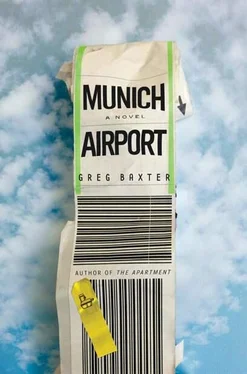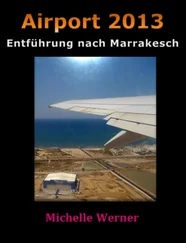We should look this woman up, what was her name?
I have no idea. I never asked.
He said, Too bad.
I finished my bowl of eggs. We still had Charlemagne ahead of us, so we left the table, went upstairs for our things, checked out, and hit the road. We headed eastward, into a gray, cold rainfall. We entered the Netherlands — a narrow, southerly appendage that took just minutes to traverse — and my father suddenly interrupted a story about the first time he saw Charlemagne’s tomb with a look of distant alarm. He stopped talking for a little while. Then he said, Do you think Miriam had a happy childhood? It was, I suppose, his way of raising the idea that had been in his mind, as it had in mine, since we first heard the news that Miriam had died — that we had missed something obvious, that her death stretched back to a time when we knew her and saw her every day. I said, I don’t know. He said, But now that I ask, what do you think? I changed the radio station. I pretended to concentrate on the driving. We had been together, in the hyperclose proximity of a road trip, for five days, and we were on each other’s nerves. I presumed that our frustration with each other had something to do with the fact that we both had searched our memories of Miriam’s childhood so thoroughly and found nothing, or at least nothing so spectacularly out of the ordinary as to explain her suicide. I looked at him, sideways, and saw that he was being truthful in his alarm, and that until that moment he’d been utterly convinced that something in Germany had caused it, or her brain had changed shape, or a madness encoded in her DNA reached its activation age. Since receiving the news of Miriam’s death, I had, at the very back of my thoughts, entertained the possibility that my father had done something awful to Miriam, something that drove her away from home, and which settled in her body like a latent and incurable plague, and finally drove her to suicide, but the look on his face that day in the car pointed to his innocence. I was both relieved and disappointed that he hadn’t asked whether Miriam and I, the two of us, had happy childhoods, disappointed because it would have been easy to answer — the answer, when he put it like that, was yes, relative to other people’s childhoods — but relieved because to include me in the question would have been an insincere gesture, and because it would have been the very thing a guilty man would have done, a man who wanted to know just how much other people knew. I said, To be honest, I never was very much concerned with her happiness or unhappiness, when we were children. He said, I don’t believe that, you were a caring older brother, you looked after her and beat up kids who picked on her. I said, I don’t remember that, either. The rain was getting heavier and heavier, but I kept us moving fast. A Mercedes passed us, going a hundred and sixty kilometers an hour, which was reckless for the conditions, and I sped up and followed his lights in the rain for as long as I could. My father said, Well, you may remember, maybe you don’t, I don’t know, but Charlemagne starved himself to death. I said, That wasn’t in your book, I don’t think. He said, No, it wasn’t in my book, but it was in Einhard. I said, I didn’t read Einhard, Dad. But he wasn’t listening to me. He said, It’s true, he was struck by a fever, and he treated fevers with abstinence from food, thinking the disease could be driven off, or at least mitigated, by fasting. I let the Mercedes go and slowed to a hundred and forty, a hundred and thirty, a hundred and twenty, but I was still shrieking past the cars in the slow lane, which were doing eighty or seventy or less. I said, It’s preposterous, what you’re about to suggest. He said, I wouldn’t quite know what to suggest. I said, You’re better off forgetting it. You’re right, he said. Then he tried to change the subject, he started going through the various aches and pains he had, in his knees, his wrists, his shoulders — all of which he blamed on stiff, small beds, and too much walking, and too much sitting in the car. I said, Dad, I need to tell you something, but I don’t want you to get upset.
Okay.
On the day I arrived, I identified Miriam’s body.
You saw her?
That’s right.
Why didn’t you tell me?
I thought I might spare you from the discomfort of it.
Discomfort?
I figured you would have done the same for me.
Then we crossed the border into Germany, and the Netherlands disappeared behind us in the rain and spray.
Our mornings, during our travels, started early. My father woke at five or six, usually went for a walk, and I woke up around seven, stumbled into the restaurant for breakfast, and drank four or five cups of coffee. Our hotel rooms were always next to each other. We sat side by side in the car. I did all the driving, except for one stretch between Kaub and Koblenz, because I got drunk on some wine we’d bought at Kloster Eberbach — the cloister where they filmed The Name of the Rose . I was glad it was coming to an end. I was glad to be heading back to Berlin, where we could go back to waiting, and I could have some time to myself. I was sure my father had wanted to spend the night in Aachen, get a hotel overlooking the cathedral, walk around, think about how many hours he’d spent studying the life of Charlemagne in order to understand the Middle Ages and the history of Europe. But now, in the final minutes before our arrival, he was quiet, severe, strange, and the way he was breathing suggested he had decided that his own preoccupation with visiting Aachen Cathedral was tiresome. When I saw a sign for the exit to Aachen, I said, We’ll park, see the cathedral, have a bite to eat, and get back on the road. If we leave Aachen by eight, we can make Berlin by one or two.
He said, Forget Aachen, let’s just keep going.
I took the exit anyway, and he didn’t protest. The stop in Aachen felt necessary to me now, not only because, without it, the previous five days would not have any meaning, but also because it would give my father, or force upon him, depending on his mood, an opportunity to fill the space I’d created by my confession, a chance to imagine what it might have been like to be in the morgue with me. I saw her corpse in my mind a hundred times a day, I still do, and when the memory arrives it is like a blinding light, I go hot all over, it obliterates all other thoughts.
My father’s book begins with the fall of Rome. It portrays a continent with an uncertain future, in peril, disorganized, fragmented, heterogeneous. In what is now eastern France, and what is now the Rhineland, the Merovingian dynasty emerges. The first major king of the new era, an era with a troubled but unbroken link to European modernity, to the present day, is Clovis I. The Merovingians are supplanted by the Carolingians. Charlemagne becomes king. He rules from Aachen. From here the ambitions of Rome will be realized by Germans — the Germanic tribes who would become the various nationalities of power and wealth in Europe — a dream of Latin Christendom, but more than that, something new, not conceived in Rome. And this new thing is the embryo of what came to be called Europe. Charlemagne becomes emperor. His principal motivation is a zeal for unity and harmony— unitas and consonantia —and his principal despair is variety, in particular the differences, among the many provinces of his kingdom, in church music and chant. His successors will inherit and advance the drive for cultural, legal, military, and political uniformity — and Europe, as the story of the rise of, and resistance to, this uniformity, will be born. The push outward from the Rhineland is unlike colonialism of the eighteenth and nineteenth centuries, when colonial powers get entangled in countries that supply raw materials. In the Middle Ages, colonialism is about reproduction. Rather than extract economic value from the colonized place, settlers replicate their own social and religious practices. I was remembering my father’s book — I had filled the pages of a notebook with quotes from it, and as we drove along the main road from the motorway to the city center, a road full of warehouse stores and car dealerships, I had the wondrous feeling that we were going to see Charlemagne to tell him that his mission was accomplished, but that it had brought upon the earth a barbarism and slavery as constricting and ignoble as anything he had ever witnessed — though at that moment I could not tell if I had started to sound like my father, like Otis, or like myself, ten days removed from work. My father and I arrived in Aachen just before six, and we thought the cathedral would close at six. So I drove that main road like a maniac, and when we got into the center I ran a lot of red lights. I cut across pedestrians. I went the wrong way down two one-way streets. Be careful, be careful, my father kept saying. Finally he said, I think I’m going to close my eyes. And he really did close his eyes.
Читать дальше











